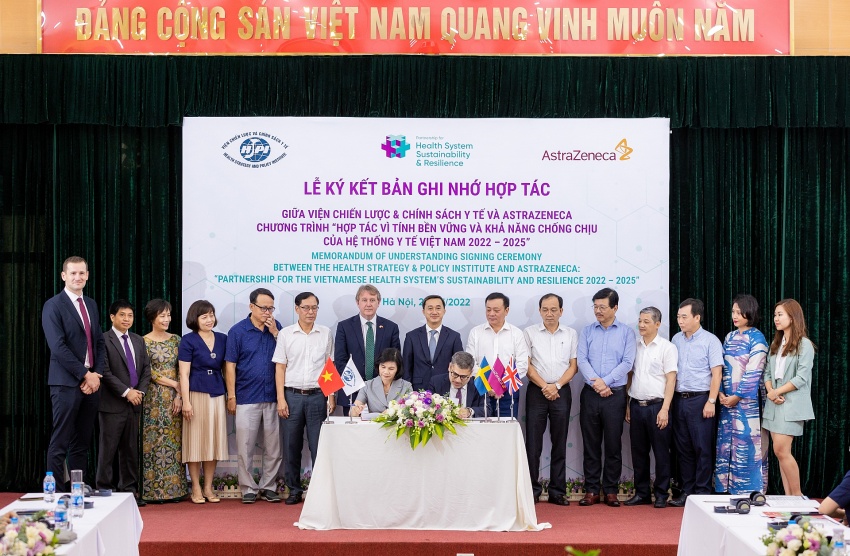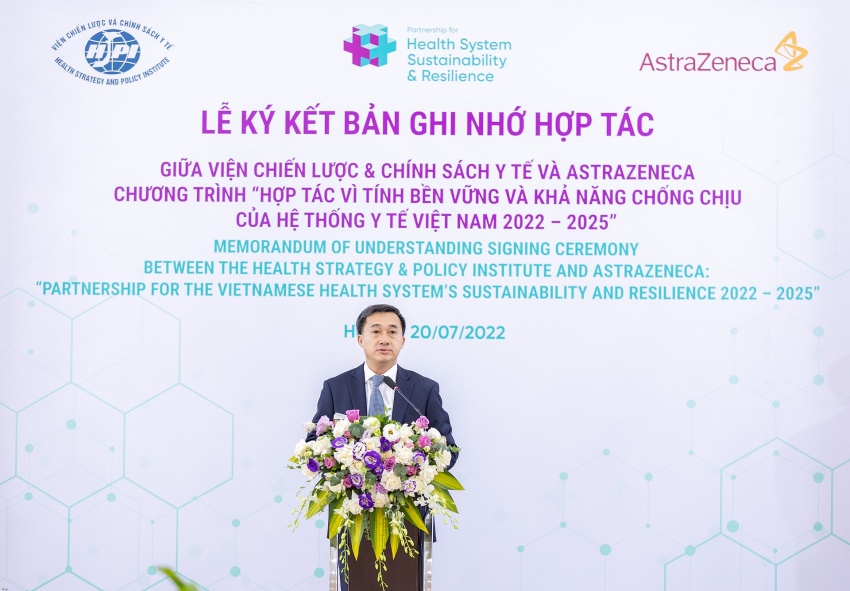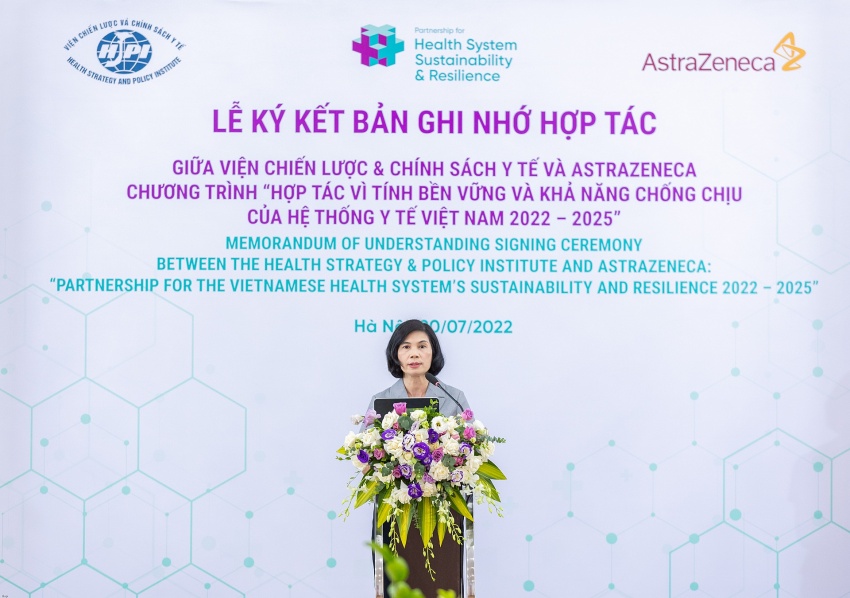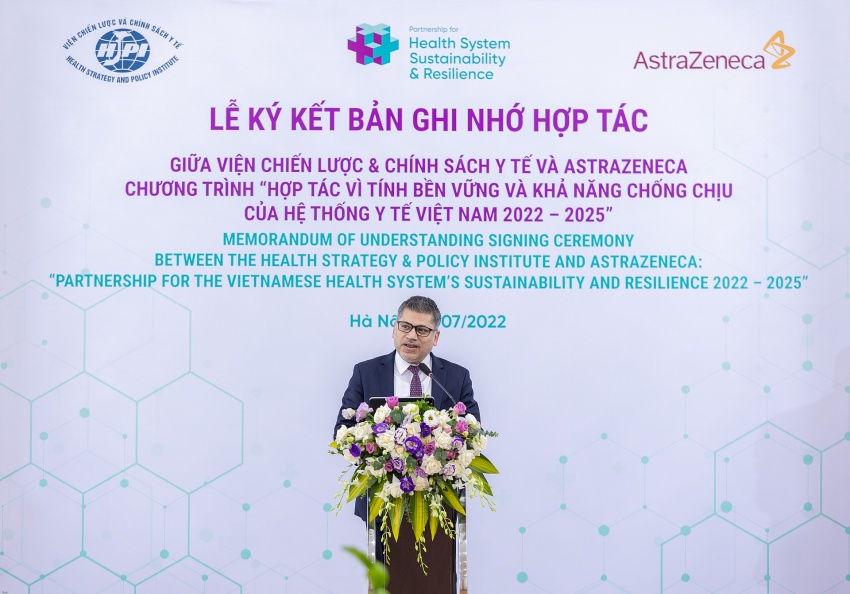AstraZeneca enhancing sustainability and resilience of healthcare system
 |
| Representatives of the HSPI and AstraZeneca Vietnam signed the MoU on July 20 |
Accordingly, with support from AstraZeneca, HSPI will advance the research and recommendation of policy solutions according to three main objectives, including strengthening the sustainability of health financing; ensuring Vietnam’s self-sufficiency in terms of medicine and vaccine supplies; and improving access to healthcare and the management and treatment of non-communicable diseases at medical facilities.
Addressing the event, Deputy Minister of Health Tran Van Thuan said, "Over the last two years, Vietnam has had many achievements in fighting the pandemic. However, reality shows that its healthcare system was heavily affected by both the pandemic and pre-existing issues. Therefore, it is crucial to evaluate the healthcare system as a whole and draw lessons from our experience. I'm confident that the cooperation between the HSPI and AstraZeneca will succeed and provide many advanced and practical solutions to enhance the sustainability and resilience of Vietnam's health system."
 |
| Prof. Dr. Tran Van Thuan, Deputy Minister of Health, gave a speech at the signing ceremony |
Dr. Tran Thi Mai Oanh, director of the HSPI added, "The pandemic has allowed us to objectively assess the strengths and limitations of the healthcare system. Through this programme, we aim to provide valuable evidence to build health policies that will help boost the Vietnamese healthcare system’s post-pandemic recovery and preparedness for future diseases."
Mai Oanh continued, "We are thankful for the continued support of AstraZeneca and other partners in this new phase of the PHSSR, joining hands to build a fair, efficient, quality, and sustainable healthcare system for all."
 |
| Dr. Tran Thi Mai Oanh, director of the HSPI, presented policy recommendations, objectives, and implementation plans for the 2022-2025 period |
This MoU follows the successful implementation in 2020 and 2021 of the global PHSSR’s pilot phase, which was jointly founded by the World Economic Forum, London School of Economics, and AstraZeneca.
Vietnam was the first country in Asia to join the programme, and as part of it, HSPI adopted a framework devised by the PHSSR to analyse the strengths and limitations of the health system, which were later presented in the PHSSR Vietnam report.
Nitin Kapoor, chairman and general director of AstraZeneca Vietnam and Asia Area Frontier Markets said, "During this period when COVID-19 has subsided, we need to seize the opportunity to address other important and urgent challenges, such as ensuring healthcare for patients with non-communicable diseases, namely cancer, cardiovascular and respiratory diseases; as well as maintaining the continuous supply of health financing, medicines, vaccines and medical equipment."
Kapoor added, "We hope that this partnership with HSPI and partners will comprehensively strengthen the healthcare system, accelerate local manufacturing, and benefit the whole society.”
 |
| Nitin Kapoor, chairman and general director of AstraZeneca Vietnam and Asia Area Frontier Markets |
The signing ceremony attracted Marcus Winsley, British Deputy Ambassador to Vietnam; Dr. Le Van Kham, Standing Member of the National Assembly's Social Affairs Committee; leaders of various departments under the Ministry of Health; and representatives of the Vietnam Social Security, the Embassy of Sweden, universities, and media agencies.
| The PHSSR’s mission is to study and build healthcare systems that are both resilient to crises and sustainable in the face of long-term stress. It does this by providing tools and resources for research, a focal point for collaboration and knowledge exchange within and between countries, and a platform to disseminate and catalyse the adoption of breakthrough insights. The framework was run as a pilot in Vietnam and seven other countries (the United Kingdom, France, Germany, Italy, Poland, Spain, and Russia) analysing health systems against the framework criteria. An action plan was then established for each country with a series of steps for health leaders and policymakers to take to strengthen systems against future crises. In 2022, the framework is running in 13 more countries. Additionally, in 2022, Philips, KPMG, the WHO Foundation, the Center for Asia-Pacific Resilience and Innovation, and Apollo Hospitals have come on board as partners. |
What the stars mean:
★ Poor ★ ★ Promising ★★★ Good ★★★★ Very good ★★★★★ Exceptional
Themes: Healthcare Platform
- PM outlines new tasks for healthcare sector
- Opella and Long Chau join forces to enhance digestive and bone health
- Hanoi intensifies airport monitoring amid Nipah disease risks
- Cosmetics rules set for overhaul under draft decree
- Policy obstacles being addressed in drug licensing and renewal
Related Contents
Latest News
More News
- PM outlines new tasks for healthcare sector (February 25, 2026 | 16:00)
- Masan Consumer names new deputy CEO to drive foods and beverages growth (February 23, 2026 | 20:52)
- Myriad risks ahead, but ones Vietnam can confront (February 20, 2026 | 15:02)
- Vietnam making the leap into AI and semiconductors (February 20, 2026 | 09:37)
- Funding must be activated for semiconductor success (February 20, 2026 | 09:20)
- Resilience as new benchmark for smarter infrastructure (February 19, 2026 | 20:35)
- A golden time to shine within ASEAN (February 19, 2026 | 20:22)
- Vietnam’s pivotal year for advancing sustainability (February 19, 2026 | 08:44)
- Strengthening the core role of industry and trade (February 19, 2026 | 08:35)
- Future orientations for healthcare improvements (February 19, 2026 | 08:29)

 Tag:
Tag:

























 Mobile Version
Mobile Version